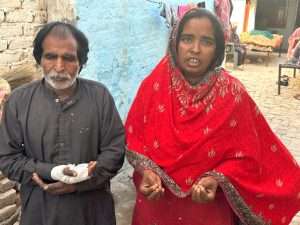In the heart of Punjab’s Okara District, a family has been plunged into unimaginable agony. On January 20th, 12-year-old Ariha, a bright-eyed child full of dreams, was ripped away from the safety of her home by three armed men. Her mother, Sumera Gulzar, fought desperately to protect her daughter, but her pleas and resistance were no match for the criminals who forced their way in and snatched the child away in a white car.
The main perpetrator, 40-year-old Sajjad Baloch, a neighbor known for his criminal history, showed no remorse. The very next day, he called Sumera with a chilling message—a mother’s worst nightmare made real. He threatened to rape her daughter and sell her to sex traffickers if the family dared to involve the authorities. The helpless parents begged Baloch’s family to intervene, but their cries were met with silence. And then, even that faint hope disappeared—on January 24th, Baloch’s family abandoned their home, locking the doors behind them and vanishing without a trace.
For more than a week now, the desperate parents have visited the police station every day, clinging to the hope that someone, anyone, will bring Ariha back. But hope is fading. The police have yet to make a breakthrough. The father, Gulzar Masih, devastated and broken, spoke of his helplessness. “We are poor. We don’t have the money to bribe the police. We don’t have the means to fight in court. We just want our daughter back.”
Ariha, a child who should be in school, playing with her friends, and dreaming of a bright future, now faces the horrifying prospect of being lost to the darkness of human trafficking. The thought of her being forced into marriage with a man old enough to be her grandfather is an unbearable reality that her parents are now forced to contemplate.
Joseph Janssen, a field officer for the Jubilee Campaign, has stepped in to provide legal aid to the family. He acknowledges the grim reality—this is not an isolated case. Across Pakistan, young girls from Christian and other minority communities are abducted, forcibly converted, and subjected to unimaginable abuse. These young victims are trapped in a society that too often turns a blind eye, allowing perpetrators to act with impunity.
“These aren’t just kidnappings,” Janssen states. “These are the systematic violations of human rights, the destruction of innocent lives, and the silencing of a community that already suffers discrimination and neglect.”
The lack of effective legal protections has allowed crimes like these to become all too common. Families like Ariha’s are left powerless, silenced by poverty and fear, abandoned by a justice system that fails to recognize their suffering.
Gulzar Masih has only one appeal—to the government, to senior police officials, to anyone with the power to act. “Please, bring our daughter back. Please, don’t let her be lost forever.”
The fear in his voice, the anguish in Sumera’s tear-streaked face, and the empty bed where Ariha once slept are reminders of a grim reality—time is running out. Each day that passes without action is another day that a child suffers unimaginable horrors.
Pakistan must act. The government must uphold its international obligations and put an end to the culture of impunity surrounding these heinous crimes. The laws against child marriage and forced conversions must be enforced. Those who prey on the most vulnerable must face justice.
Ariha is just 12 years old. She deserves to be home, safe in her mother’s arms, free to dream of a future untainted by terror. The world cannot remain silent.
